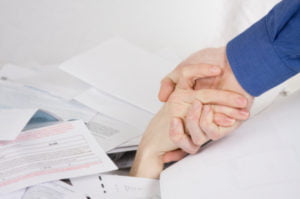The Automatic Stay in Bankruptcy
 One of the primary reasons many people seek relief through bankruptcy is to take advantage of the automatic stay. This is a function of bankruptcy that pauses all legal actions against you throughout the duration of your bankruptcy. If you’re dealing with creditor calls, foreclosure, repossession, and other negative outcomes of financial strain, an automatic stay can help you.
One of the primary reasons many people seek relief through bankruptcy is to take advantage of the automatic stay. This is a function of bankruptcy that pauses all legal actions against you throughout the duration of your bankruptcy. If you’re dealing with creditor calls, foreclosure, repossession, and other negative outcomes of financial strain, an automatic stay can help you.
At Allmand Law Firm, PLLC, we can assist you in obtaining an automatic stay through bankruptcy. We will handle your creditors and file all necessary legal documents. Call us today at 215-884-4020 to speak to a bankruptcy attorney and begin the process.
What Is an Automatic Stay and How Does It Work?
When you file for bankruptcy, something called the “automatic stay” is put into place — effectively stopping creditors in their tracks. Not only can the automatic stay protect you against lawsuits regarding the debt that you owe, but it can also shield you from any further collection efforts by creditors, collection agencies, or government entities.
Essentially, the automatic stay was designed to stop creditors from seizing property that belongs to the bankruptcy estate, as well as any property that is exempt by state or federal law. In most cases, its reach will extend to foreclosures, auto repossessions, wage garnishments, and debt collections, making it a powerful tool for debtors.
With an automatic stay in place, creditors are prohibited from:
- Beginning or continuing a lawsuit
- Continuing their debt collection efforts
- Repossessing a debtor’s property
- Garnishing a debtor’s wages
- Foreclosing on a debtor’s home
The automatic stay puts all debt collection efforts on hold. It does not do away with your debts. Thus, it is important to work with a bankruptcy attorney to collect information from your creditors and develop a liquidation or payment plan, depending on whether you are filing Chapter 7 or Chapter 13.
How Do I Obtain an Automatic Stay?
An automatic stay is immediately initiated when you file for bankruptcy. Whether you choose to file Chapter 7 or Chapter 13, you will be able to utilize an automatic stay. When you file your initial bankruptcy petition, all of your creditors will be notified of the pending bankruptcy. They will immediately have to pause collection efforts and legal actions. Other pending legal cases will also pause as the bankruptcy court assesses your belongings and evaluates your debt.
How Long Will the Automatic Stay Protect Me?
 Generally, the stay will remain in effect for the duration of your bankruptcy case. This means that as long as you are involved in the bankruptcy process, creditors cannot take action against you. However, this also means that the automatic stay will be lifted once you have received a discharge and your bankruptcy case is closed.
Generally, the stay will remain in effect for the duration of your bankruptcy case. This means that as long as you are involved in the bankruptcy process, creditors cannot take action against you. However, this also means that the automatic stay will be lifted once you have received a discharge and your bankruptcy case is closed.
A Chapter 7 bankruptcy typically lasts between four to six months after you file. It can take longer, depending on:
- how much debt you have,
- creditor challenges, and
- whether all of your filings are correct.
Thus, an automatic stay related to a Chapter 7 will last up to six months. However, at the end of that period, bankruptcy should liquidate or eliminate your debt. If it is not, your bankruptcy lawyer can help you handle remaining debt that was exempt from the bankruptcy.
A Chapter 13 bankruptcy can take as long as five years to complete the agreed upon payment plan. An automatic stay will be in place initially; however, any debts collection that is being put on hold through that automatic stay should be dealt with in the bankruptcy. The bankruptcy court can help you establish a payment plan to address all creditors so that they will no longer harass you.
Could a Creditor Lift the Automatic Stay?
The automatic stay prohibits creditors from continuing their collection efforts; however, there are certain circumstances under which a creditor could ask the court to remove or “lift” the stay. This is typically true of a creditor who has a lien on your property, although any creditor has the right to request that an automatic stay be lifted.
Your creditor’s request to lift the automatic stay may be granted if you have:
- fallen behind on your car payments
- fallen behind on your mortgage payments
- not maintained home or auto insurance
- delayed debt repayment in Chapter 13
- continuously failed to pay your rent
These situations all involve failure to maintain payments on your debts after you file bankruptcy. The automatic stay will put a hold on all creditor actions against you initially. However, if you fail to upkeep payments during and after bankruptcy, then creditors can request a lift of the automatic stay.
When the Automatic Stay May Not Be Implemented
If the bankruptcy court considers you a “serial” or “repeat” bankruptcy filer, you may not benefit from an automatic stay. If you have filed bankruptcy once within the past year and the court dismissed it, your automatic stay will only be valid for 30 days after a new filing within the same year. In addition, if you have filed bankruptcy two or more times within the past year and the court dismissed the claims, you will not get an automatic stay at all. These exceptions are only in place for a period of one year. If it has been more than one year since you filed and dismissed a bankruptcy, then you do get the benefit of an automatic stay.
What if a Creditor Violates the Automatic Stay?
If a creditor violates the stay by continuing their collection efforts, attempting to seize your property, or garnishing your wages, the court can penalize them. The court can also hold liable anyone who willfully violates the stay in your bankruptcy case for actual damages caused by the violation and, in some cases, even punitive damages.
Call Allmand Law Firm, PLLC for More Information
If you are facing financial troubles and have considered filing Chapter 7 or Chapter 13 bankruptcy, do not hesitate to speak with a Dallas bankruptcy attorney at Allmand Law Firm, PLLC. As the largest bankruptcy filing firm in the state, we have helped thousands of people find relief from their debt. Now, we’re ready to help you.
Call our bankruptcy lawyers in Dallas, TX for a free consultation.